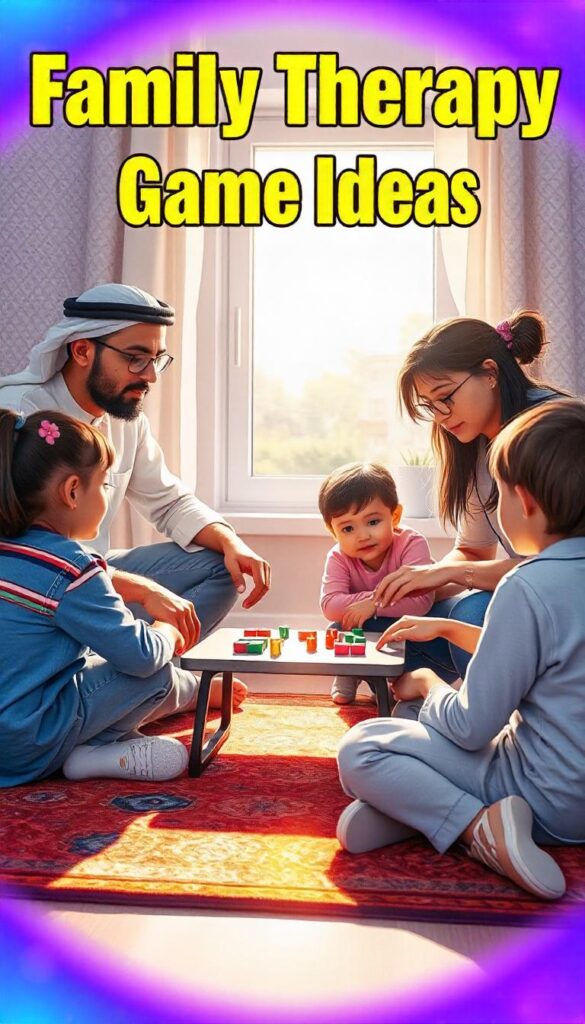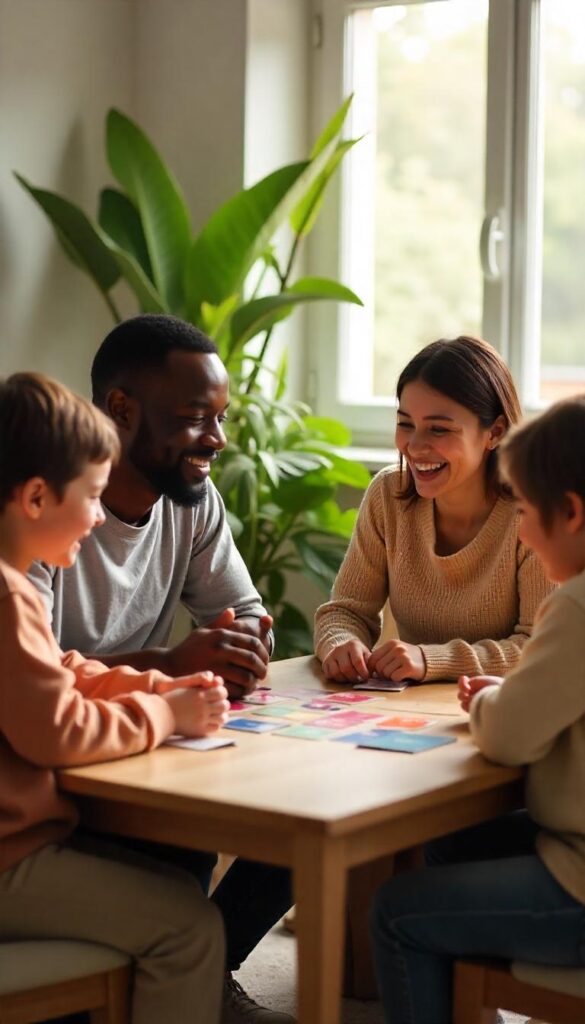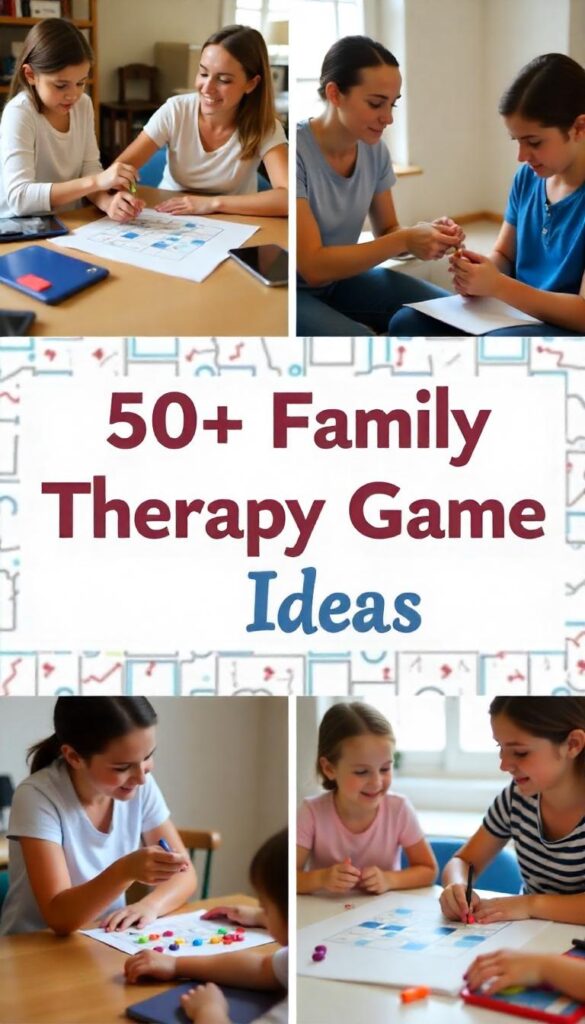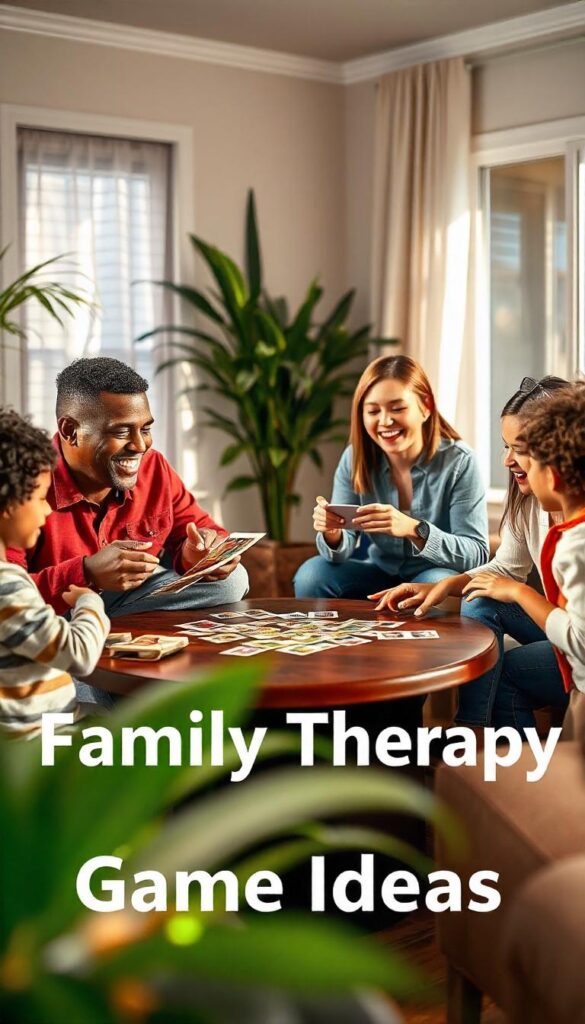Family Therapy Game Ideas: Family therapy games are powerful tools to strengthen communication, foster trust, and address underlying issues in a fun and engaging way. Games like “Feelings Charades” encourage family members to express emotions through gestures, helping everyone become more comfortable discussing their feelings. “The Ungame”, a non-competitive card game, promotes thoughtful conversations by asking open-ended questions about hopes, fears, and experiences.
“Trust Fall” and similar activities build trust and physical connection, while board games like “Totika” use question prompts to explore emotions and family dynamics. Creative games such as drawing shared memories or building a family tree together help deepen bonds while reflecting on positive moments. Role-reversal activities, where family members act out each other’s roles, encourage empathy and understanding. These games are adaptable to various age groups and offer a safe, structured environment for families to grow together while addressing challenges in a constructive and meaningful way.
Family Therapy Game Ideas
Here’s a detailed list of 100+ Family Therapy Game Ideas that focus on communication, bonding, conflict resolution, and trust-building. These games can be used in therapeutic settings to help families develop healthier relationships, improve emotional expression, and enhance problem-solving skills.
Communication and Bonding Games
- Two Truths and a Lie – Each person shares two truths and one lie, and others guess the lie.
- Family Storytelling – Each family member shares a story from their past, promoting emotional connection.
- Active Listening Exercise – One person shares something, and the other reflects back what they heard.
- Emotion Wheel – Spin the wheel and express how you feel using a specific emotion.
- Compliment Circle – Each person gives a compliment to another family member.
- Pass the Compliment – One person gives a compliment, and the next person passes it to someone else.
- Family Vision Board – Create a board with everyone’s hopes and dreams for the future.
- Trust Falls – One person falls back into the arms of another, building trust.
- Emotion Charades – Act out different emotions for the family to guess.
- Feelings Jar – Each person writes down their feelings on a piece of paper and shares them later.
- Family Tree – Create a family tree together, talking about important memories from each generation.
- Family Quilt – Each person contributes a square that represents their personality or a special moment.
- Family Motto – Collaboratively create a family motto or mantra.
- Appreciation Box – Everyone writes down things they appreciate about each family member.
- Share and Tell – Each member shares something meaningful to them from the week.
Conflict Resolution Games
- Role-Playing Difficult Conversations – Act out difficult conversations that need to be addressed in the family.
- Anger Ball – Toss a ball around while discussing what makes you angry and how to deal with it.
- Problem-Solving Circle – Discuss a family issue and brainstorm solutions together.
- Time-Out Basket – Use a basket to hold calming items when someone needs a break from a conflict.
- The Apology Game – Practice giving and receiving apologies with sincerity.
- Conflict Resolution Bingo – Make bingo cards with conflict-resolution strategies and practice them during conflicts.
- Collaborative Decision-Making – Give each family member a turn to make a decision for the family.
- Win-Win Game – Practice finding solutions where everyone in the family wins.
- Family Mediation – Assign one person to mediate a conflict between two family members.
- Fighting Fair Cards – Cards with tips on resolving conflicts peacefully and respectfully.
- Feelings Ball Toss – Toss a ball around and share how you’re feeling about a family disagreement.
- I-Messages Exercise – Practice using “I feel” statements instead of “You always” statements during conflicts.
- Peacekeepers – Create a game where the goal is to resolve conflicts by encouraging open communication and compromise.
- Resolution Scenarios – Present a scenario and have the family work together to resolve it peacefully.
Trust and Empathy Games
- Blindfolded Obstacle Course – One person is blindfolded while another gives them instructions to navigate an obstacle course.
- Trust Walks – Walk in pairs with one person blindfolded, trusting the other to guide them.
- The Empathy Circle – One person speaks about their feelings, and others respond empathetically.
- Secret Compliment – Write down anonymous compliments to family members and share them.
- Shared Goals – Each family member shares a personal goal, and others provide support and encouragement.
- Listening Pairs – Pair up family members, and one listens while the other talks about a challenge they’re facing.
- Tug of War (with emotions) – Use tug of war to symbolize the emotional pull and practice letting go.
- Building Together – Collaboratively build something (like a tower or structure) that symbolizes trust.
- Shared Journaling – Create a family journal where everyone writes down thoughts and feelings and shares them with the group.
- Empathy Role Play – Put yourself in another family member’s shoes to understand their perspective.
- The Sharing Game – Take turns sharing something personal, and the others respond with empathy.
- The Object Game – Choose an object and have everyone talk about how it relates to their life.
- Feelings Charades – Act out various feelings, and others try to guess them.
Self-Expression and Emotional Awareness Games
- Emotion Charades – Act out different emotions without words, and others guess what you are expressing.
- Word Association – Say a word, and everyone says the first word that comes to their mind, helping to explore emotional reactions.
- Draw Your Feelings – Draw how you feel in the moment.
- Feelings Diary – Each family member keeps a diary to write about their feelings daily.
- Feelings Mapping – Use a large paper or board to map out how each person is feeling at the moment.
- Anger Thermometer – Use a thermometer chart to show how angry you feel and discuss how to calm down.
- Express Yourself – Each person shares one thing that’s on their mind that they haven’t said out loud.
- Word Cloud – Write words that describe how you feel and put them together into a word cloud.
- Feeling Wheel – Use a feeling wheel to identify and discuss emotions.
- Emotion Cards – Cards with different emotions that prompt you to talk about how you’re feeling.
- Compliment Cards – Everyone writes compliments about each person and shares them.
- Inside/Outside Exercise – Talk about what you’re feeling on the inside versus what others might see on the outside.
- Emotion Thermometer – Rate how you’re feeling from 1-10 and discuss it with the family.
- Check-In Circle – Go around the circle and share one positive and one negative feeling.
Fun and Relaxing Games
- Family Talent Show – Each family member performs a talent, big or small, to bond and have fun.
- Pictionary – A drawing game that helps families express ideas visually.
- Memory Lane – Share family memories and reminisce together.
- Mad Libs – A fun game where you fill in blanks to make hilarious and spontaneous stories.
- Guess the Sound – Play sounds and have others guess what they are.
- The Freeze Game – Play music and freeze when it stops, helping kids control impulses.
- Shadow Puppets – Create shapes with hands and have the family guess them.
- Family Karaoke – Sing favorite songs together, encouraging joy and connection.
- Simon Says – A simple, interactive game that encourages following instructions and self-control.
- Balloon Pop – Write fun challenges on pieces of paper and put them in balloons to pop and complete.
- Freeze Dance – Dance to music and freeze when it stops, promoting fun and movement.
- Story Cubes – Use dice with pictures to create a family story.
- Family Pictionary – Draw pictures that represent different words or situations and have others guess.
- Memory Sharing – Share your favorite family memories and reminisce together.
- Dance Party – Have a spontaneous family dance party to release stress and bond.
Teamwork and Cooperation Games
- Building Together – Build something as a team, such as a puzzle or structure.
- Family Relay Race – Compete as teams in a fun relay race.
- Tower of Trust – Build a tower using blocks and work together to make it as tall as possible.
- Puzzle Solving – Work together to solve a jigsaw puzzle.
- Balloon Volleyball – Use a balloon for a game of volleyball to encourage teamwork.
- Team Drawing – Work together to complete a drawing with each person contributing to the final picture.
- Human Knot – Stand in a circle and try to untangle yourselves without letting go of each other’s hands.
- Group Jenga – Play Jenga, but everyone works together to pull out blocks without toppling the tower.
- Cooperative Board Games – Games like Pandemic or Forbidden Island that require teamwork to win.
Gratitude and Appreciation Games
- Gratitude Jar – Each person writes something they are grateful for, and others read them aloud.
- Thank You Cards – Write thank-you notes to each other to express appreciation.
- Appreciation Round – Take turns appreciating each family member for something specific they did.
- Family Gratitude Journal – Each person adds something they’re grateful for each day.
- Gratitude Rock – Pass around a rock, and whoever holds it shares something they are grateful for.
- Compliment Battle – Compete to see who can give the most meaningful compliment.
- Thank You Notes – Write thank-you notes to each other for thoughtful actions.
- Appreciation Tokens – Hand out tokens or cards when someone does something thoughtful.
Life Skills and Educational Games
- Money Management Game – Use play money to simulate budgeting and saving.
- Career Exploration – Share family members’ careers and what skills are required for them.
- Problem-Solving with Board Games – Games like Monopoly or Chess can teach strategy and critical thinking.
- Financial Planning – Have discussions about saving and budgeting in a fun, interactive way.
- Cooking Challenge – Work together to make a family meal, discussing planning and teamwork.
- Family Trivia – Test your knowledge of each other’s lives with fun family trivia.
- Home Improvement Projects – Take on small DIY projects to work together as a family.
- Organizational Challenge – Challenge each other to organize a space or item at home.
- Creative Writing – Encourage everyone to write short stories and share them with the family.
Fun Family Bonding Exercises
- Family Scavenger Hunt – Create a list of items to find in the house or yard.
- Memory Box – Create a memory box where everyone contributes items that represent memories.
- Guess the Family Member – Share a fact about a family member and have others guess who it is.
- DIY Family Games – Create your own games based on favorite family activities and traditions.
These Family Therapy Game Ideas aim to enhance family bonding, develop healthy communication skills, resolve conflicts, and build emotional awareness in a fun and engaging way. They can be adapted to different family dynamics and provide meaningful opportunities for connection and growth.

Hi, I’m Maggie Culp, the founder of PartyVibesFun.com, based in North Little Rock, Arkansas, United States! With a passion for creating unforgettable celebrations, I specialize in turning any event into a fun and vibrant experience. From birthday parties to themed gatherings, I’m here to help you bring your party ideas to life with ease and excitement. Whether you’re looking for unique games, creative themes, or party planning tips, I’m dedicated to making sure every moment of your event is filled with joy. Let’s create memories together and make your next party the talk of the town!





